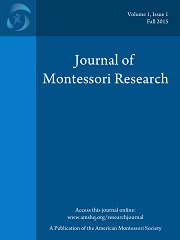Examining a Public Montessori School’s Response to the Pressures of High-Stakes Accountability
DOI:
https://doi.org/10.17161/jomr.v1i1.4913Palabras clave:
Montessori Method, Assessment, High-Stakes Accountability, Case StudyResumen
In order to succeed in the current school assessment and accountability era, a public Montessori school is expected to achieve high student scores on standardized assessments. A problem for a public Montessori elementary school is how to make sense of the school’s high-stakes assessment scores in terms of its unique educational approach. This case study examined a public Montessori elementary school’s efforts as the school implemented the Montessori Method within the accountability era. The research revealed the ways the principal, teachers, and parents on the school council modified Montessori practices, curriculum, and assessment procedures based on test scores. A quality Montessori education is designed to offer children opportunities to develop both cognitive skills and affective components such as student motivation and socio-emotional skills that will serve them beyond their public school experiences. Sadly, the high-stakes testing environment influences so much of public education today. When quality education was measured through only one narrow measure of success the result in this school was clearly a restriction of priorities to areas that were easily assessed.
Referencias
References
Berliner, D. C. & Nichols, S. L. (2007, March 12). High-Stakes testing is putting the nation at
risk. Education Week. Retrieved from http://www.edweek.org/ew/articles/2007/03/12/27berliner.h26.html.
Blank, J. (2009). Situated in school scripts: Contextual early childhood teaching. Teaching and Teacher Education, 25, 251-258.
Bloom, B., Hastings, J. T., & Madaus, G. F. (1971). Handbook on formative and summative evaluation of student learning. New York, NY: McGraw-Hill.
Brookhart, S.M. (2009). The many meanings of “multiple measures.” Educational Leadership, 67(3) 6-12.
Creswell, J.W. (2012). Qualitative inquiry and research design: Choosing among five
approaches (3rd ed.). Sage.
Dohrmann, K. R., Nishida, T. K., Gartner, A., Lipsky, D. K., Grimm, K. (2007). High school outcomes for students in a public Montessori program. Journal of Research in Childhood Education,22(2), 205-217.
Edwards, C. P. (2002). Three approaches from Europe: Waldorf, Montessori, and Reggio Emilia. Early Childhood Research & Practice,4(1). ERIC Document: ED464766.
Gareis, C. & Grant, L. (2015). Teacher-Made assessments: How to connect curriculum, instruction and student learning (2nd ed.). Routledge.
Guskey, T. R. (1997). Implementing Mastery Learning. Wadsworth Publishing.
Guskey, T. R. (2005). Mapping the road to proficiency. Educational Leadership,63(3), 32-38.
Guskey, T.R. (2014). On your mark: Challenging the conventions of grading and reporting. Solution Tree.
Hamel, J., Dufour, S. & Fortin, D. (1993). Case study methods. California: Sage
Publications.
Hattie, J. (2012). Visible learning for teachers: Maximizing impact on learning. Oxon: Routledge.
Hurley, A. (2004). “A perfect host for accountability" Philosophical Studies in Education (35).
Klinger, D.A., McDivitt, P.J., Howard, B.B., Munoz, M.A., Roger, W. T. & Wylie, E.C. (2015).
Classroom assessment standards for preK-12 teachers: Joint committee on standards for educational evaluation. Kindle Edition.
Kifer, E. (1997). “Why I like test scores and what they tell me about curriculum” Journal of Curriculum Studies,20(6), 627-635.
Kifer, E. (2000). Large-Scale assessment dimensions, dilemmas, and policy.Thousand Oaks, CA: Corwin Press.
Lillard, A. S. (2012). Preschool children's development in classic Montessori, supplemented Montessori, and conventional programs. Journal of School Psychology,50(3), 379–401.
Lillard, A. S. (2013). Playful learning and Montessori education. American Journal of Play,5(2), 157-186.
Lillard, A. S., & Else-Quest, N. (2006). Evaluating Montessori education. Science-New York Then Washington,311(5795), 1893-1894.
Lillard, P. P. (1996). Montessori today: A comprehensive approach to education from birth to adulthood. Schocken.
Madaus, G., & Russell, M. (2010). Paradoxes of high-stakes testing. Journal of Education,190(1/2), 21-30.
Miles, M. & Huberman, M. (1994). Qualitative data analysis: An expanded sourcebook. California: Sage Publications.
Miles, M., Huberman, M. & Saldana, J. (2014). A methods source book. California: Sage Publications.
Miller, M.D., Linn, R.L. & Gronlund, N. E. (2013). Measurement and assessment in teaching (11th ed.). New Jersey: Pearson.
Montessori, M. (1966). The secret of childhood. Canada: Fides Publishers, Inc.
Montessori, M. (1964). The Montessori Method. United States of America: Schocken Books Inc.
Montessori World School. Elementary I curriculum guide. Retrieved on October 4, 2015 from
http://www.montessoriworldschool.com/public/pdf/curriculumElemI.pdf
Murray, A. (2015, February, 24). Expanding access to Montessori education: An opportunity for disadvantaged students [Web log post]. Retrieved from
http://ciep.hunter.cuny.edu/expanding-access-to-montessori-education-an-opportunity- for-disadvantaged-students/.
Murray, A. (2011). “Montessori elementary philosophy.” Montessori Life: A Publication of The American Montessori Society,23(1), 22-33.
Murray, A., & Peyton, V. (2008). “Public Montessori elementary schools: A delicate balance” Montessori Life: A Publication of The American Montessori Society,20(4), 26-30.
Nichols, S. L., & Berliner, D.C. (2007). Collateral damage: How high-Stakes testing corrupts America's schools. Harvard Education Press.
Patton, M. Q. (1990). Qualitative research and evaluation methods. California: Sage Publications.
Patton, M. Q. (2001). Qualitative research and evaluation methods (3rd ed.). California: Sage Publications.
Popham, W. J. (2014). Classroom assessment: What teachers need to know (7th ed.). USA: Allyn & Bacon, Inc.
Rathunde, K. & Csikszentmihalyi, M. (2005). Middle school students’ motivation and quality of experience: A comparison of Montessori and traditional school environments. American Journal of Education,111(3), 341-371.
Torrence, M., & Chattin-McNichols, J. (2012). Montessori education today. In J. Roopnarine &
J. Johnson (Eds.), Approaches to Early Childhood Education (6th ed., pp. 355-377). Peachpit Press.
Ungerer, R. A. (2011). Finding our voice in education policy discussions. Montessori Life: A Publication of The American Montessori Society, 23(4), 3.
Waugh, C. K. & Gronlund, N. E. (2013). Assessment of student achievement (10th ed.). Pearson.


